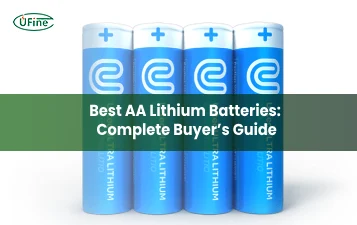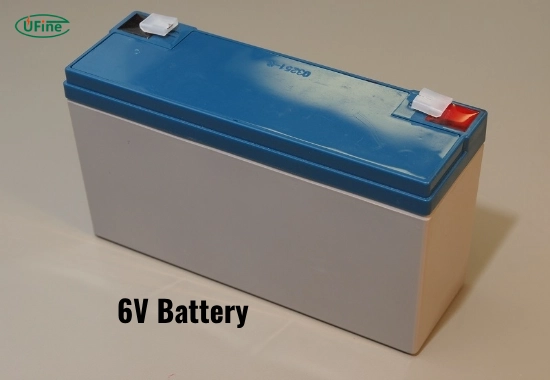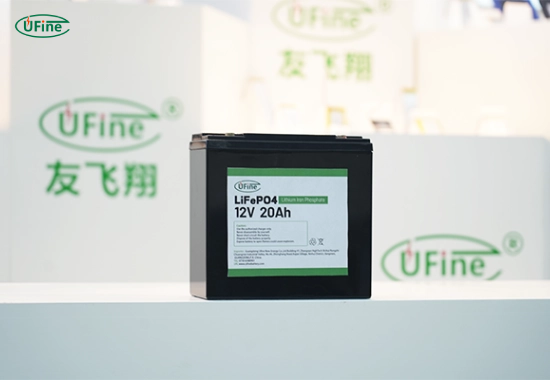When choosing the correct battery for your needs, the debate between 6V and 12V batteries often arises. Whether you’re powering a recreational vehicle, a golf cart, or a solar energy system, understanding the differences between these two voltage options is crucial. This article will guide you through the critical aspects of each battery type, including their chemical properties, helping you make an informed decision based on your specific requirements.
Part 1. What is a 6V battery?
A 6V battery is designed to provide a nominal voltage of six volts. It is commonly used in applications with lower power requirements.
Key Features of 6V Batteries
- Chemical Composition: Most 6V batteries are lead-acid types, which consist of lead dioxide (PbO2) as the positive plate and sponge lead (Pb) as the negative plate, submerged in an electrolyte solution of sulfuric acid (H2SO4).
- Capacity: Typically available in various amp-hour ratings, which indicates how long the battery can provide power.
- Size: Generally smaller and lighter than their 12V counterparts, making them easier to handle and install.
- Cost: Often more affordable than 12V batteries, which can benefit budget-conscious consumers.
Common Applications for 6V Batteries
- Golf Carts: Many golf carts use 6V batteries in series configurations to achieve higher voltages.
- Solar Systems: Some small-scale solar setups utilize 6V batteries for energy storage.
- Toys and Equipment: Various toys and small equipment rely on 6V batteries for operation.
Part 2. What is a 12V battery?
A 12V battery, on the other hand, provides a nominal voltage of twelve volts. This type of battery is widely used in many applications due to its versatility and higher power output.
Key Features of 12V Batteries
- Chemical Composition: Like 6V batteries, most 12V batteries are lead-acid types. However, they may also come in other chemistries, like lithium-ion, which offers better energy density and a longer lifespan.
- Higher Capacity: Generally offers more excellent amp-hour ratings than 6V batteries, allowing more extended usage.
- Versatility: Suitable for various applications from automotive to marine and residential energy storage.
- Availability: More commonly found in stores, making them easier to replace or upgrade.
Common Applications for 12V Batteries
- Automobiles: The standard voltage for most car batteries, powering everything from the engine to electrical systems.
- Recreational Vehicles (RVs): Used extensively in RVs for powering appliances and lighting.
- Solar Energy Systems: A popular choice for larger solar setups that require more energy storage capacity.
Part 3. Comparing performance: 6V vs 12V batteries
When comparing performance between these two types of batteries, several factors come into play that can influence your choice:
Voltage Output:
- A 6V battery provides less voltage but can be combined in series to achieve higher voltages.
- A 12V battery delivers higher voltage directly, making it suitable for most standard applications.
Capacity and Amp-Hour Ratings:
- 6V batteries typically range from about 100Ah to 220Ah.
- 12V batteries, on the other hand, can range from about 50Ah up to over 300Ah, depending on the design and application.
Size and Weight:
- Generally, 6V batteries are smaller and lighter than their counterparts.
- A standard group size for a 6V battery might be around 10 inches long and weigh approximately 60 lbs.
- A standard group size for a 12V battery could measure around 12 inches long and weigh about 70 lbs or more.
Cost Efficiency:
- While initial costs for a 6V battery may be lower, consider the total cost of ownership based on lifespan and replacement frequency.
- A typical price range for a good quality 6V battery might be $150-$250.
- For a comparable quality 12V battery, prices usually range from $200-$400.
Charging Characteristics:
- Charging a series of multiple 6V batteries can be more complex than charging a single 12V battery, which may impact efficiency during charging cycles.
Performance Comparison Table
|
Feature |
6V Battery |
12V Battery |
|
Voltage Output |
6 volts |
12 volts |
|
Amp-Hour Rating |
Typically 100Ah to 220Ah |
Typically 50Ah to over 300Ah |
|
Size |
Approx. 10 inches long |
Approx. 12 inches long |
|
Weight |
Around 60 lbs |
Around 70 lbs or more |
|
Cost |
$150-$250 | $200-$400 |
|
Charging Complexity |
More complex (series needed) |
Simpler (single unit) |
Part 4. 6V vs 12V batteries: which battery is more efficient?
Efficiency can vary based on the specific application and battery use. However, generally speaking:
- 6V Batteries are more efficient in low-power applications due to their design.
- 12V Batteries are often more efficient in high-demand scenarios where more power is required.
Factors Affecting Efficiency
- Load Requirements: The power needed will determine which battery performs better.
- Charging Cycles: How often the battery is charged can impact its efficiency and lifespan.
Part 5. Cost considerations: Is one better than the other?
When it comes to cost, both types of batteries have their pros and cons:
- Initial Purchase Price: Typically, 6V batteries are less expensive upfront.
- Long-term Costs: While they may save money initially, consider the lifespan and replacement frequency when making your choice.
Total Cost of Ownership
Evaluating total cost involves considering the following:
- Purchase price
- Maintenance costs
- Replacement frequency
- Efficiency over time
Part 6. Lifespan and maintenance of batteries: 6V vs 12V batteries
Understanding the lifespan and maintenance needs of each type can significantly impact your decision:
Lifespan
- 6V Batteries usually last around 3 to 5 years with proper care.
- 12V Batteries can last 4 to 7 years or longer, depending on usage conditions.
Maintenance Requirements
Both types generally require minimal maintenance, but consider the following:
- Regular charging cycles
- Keeping terminals clean
- Monitoring fluid levels (for lead-acid types)
Part 7. Environmental impact: are there differences?
Both battery types have environmental considerations:
Recycling Options
Both types can be recycled; however, local regulations may differ regarding disposal methods.
Energy Efficiency
The overall energy efficiency during production and use can vary based on each type of technology employed in manufacturing.
Part 8. Real-life scenarios: : 6V vs 12V batteries
Understanding how different users approach their requirements can help clarify your decision:
Scenario A: Casual Golf Cart User
For someone who uses their golf cart occasionally, investing in quality 6V batteries may be sufficient due to lower costs and adequate performance.
Scenario B: Full-time RV Traveler
12V batteries would benefit a full-time RV user, as their higher capacity supports the continuous use of refrigerators and air conditioning units.
Part 9. FAQs
-
Which type of battery should I choose for my solar energy system?
Due to its higher amp-hour ratings, a 12V battery is generally recommended for larger solar setups requiring significant energy storage capacity. -
Can I mix different voltages in my system?
Mixing different voltages can lead to inefficiencies or damage; it is best to stick with one voltage type throughout your system. -
What maintenance do these batteries require?
Both types require minimal maintenance; however, lead-acid variants need regular checks on fluid levels and terminal cleanliness. -
How do temperature extremes affect battery performance?
Download insurance provides the product download service. t can insure you to download the purchased program when you need to reinstal within 24months. -
Are lithium-ion options available for either voltage?
Yes, lithium-ion options are available for both voltages. Still, they are typically more expensive upfront compared to traditional lead-acid models.
Related Tags:
More Articles

A Buyer’s Guide for AA Size Lithium Battery
Discover the power of AA size lithium batteries—types, voltage, capacity, and more! Learn how to choose the best one for your needs. Read now!
Li-Ion Battery Prices – Where to Buy Cheap & Safe
Discover li-ion cell prices, key market factors, and how to find affordable custom batteries from top suppliers like Ufine Battery.
How Long Does a 2200mAh Battery Last?
Discover everything about 2200mAh batteries—types, charging time, lifespan, and whether it’s enough for your device.
Understanding Great Power Battery Technology: The Benefits of Lithium Solutions
Great power batteries deliver high performance for EVs, solar, and more. Learn why lithium is the top choice for power, lifespan, and efficiency.
How to Choose the Right Kayak Battery?
Need power for your fish finder or motor? This guide makes choosing the right kayak battery easy with tips on types, specs, and performance.





